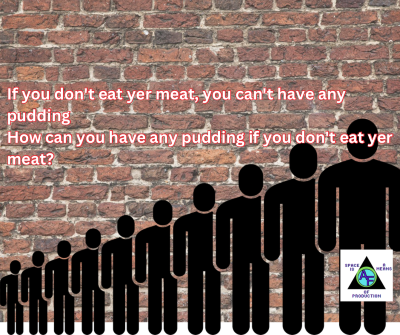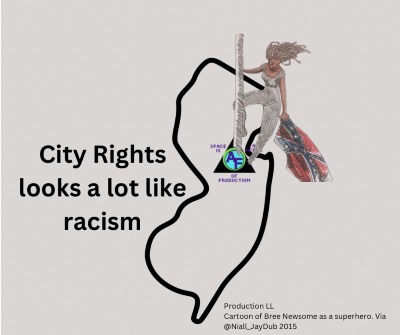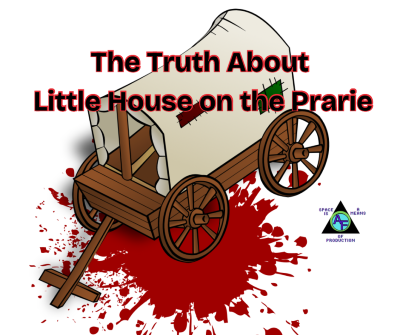Food banks and food give giveaways are a cruel farce that weakens SNAP, WIC and other programs that give people autonomy and choice

As the United States grapples with persistent inflation, economic inequality, and President Trump’s red pen which has halted $500 million worth of food bank deliveries, the hunger crisis, in the still often hypersegregated urban cities, has intensified, revealing a stark contrast between corporate welfare and austerity measures targeting vulnerable communities. Systemic inequities perpetuated by decades of USDA policies—continued and strengthened under Trump-era Secretary Sonny Perdue, lingered under Biden, and under Trump 2 has come roaring back—as now denying equitable food access for working class and poor families has become the point rather than a bug.
The $500 million in funding came from the USDA’s Commodity Credit Corporation, which at times provides additional resources to purchase food from American farmers and ranchers and send it to emergency food providers. CNN 3/22/2025
Trump’s new policies also have “the leopards eating my face” element for the American farmer who overwhelmingly voted for Trump. Under the guise of autonomy and individual choice, our administration has deliberately sabotaged a social contract, a social contract that American farmers were happy to burn by advocating the pull your bootstraps up food bank model over the giving money for food directly model via SNAP and WIC.
The consequence to poor people AND farmers has been to strip away the safety almost in its entirety—BOTH groups depended on.
Sadly too many food oriented nonprofits also unknowingly assisted in this process by supporting a neoliberal model hidden under community service.
Some say, well mutual aid can fill the gap— the vast majority of mutual aid food oriented groups depend on food that was obtained through racist USDA policies that subsidized farmers. Food banks take away money from SNAP and give it to farmers— a practice that takes away the autonomy for disproportionately women, children, and historically excluded ethnic groups while providing what is essentially welfare in the form of subsidies to farmers.
Corporate Farming vs. SNAP: A Legacy of Racial Inequity
The Farmers to Families Food Box Program, which expired in 2021, exemplified this disparity. While touted as pandemic relief, it funneled billions to large corporate farms, often bypassing minority-owned small farms and hyper segregated food apartheid urban communities. Recent analyses reveal that top recipients of USDA subsidies remained overwhelmingly white-owned conglomerates, while Black farmers—who constitute less than 2% of agricultural producers—receive just 0.3% of federal farm aid. This systemic bias will no doubt continue under the new secretary Neo—Confederate Rollins.
Rollins will be doubling down on hurting historically excluded and smaller growers by developing policies that support large-scale operations from the global market.
Meanwhile, SNAP—the nation’s most effective anti-hunger program—faces continuous threats. The 2023 Farm Bill negotiations include Republican proposals to expand work requirements, echoing Trump-era policies that sought to strip 700,000 Americans of benefits. Though Biden temporarily increased SNAP benefits, 18 states have since revoked these expansions, slashing assistance for millions as food prices continue to soar, and people will starve before the midterms. The food that most mutual aid and charity organizations depend on, is no longer going to be accessible because the farmers who provided that food are no longer being subsidized.
“The U.S. Department of Agriculture is cutting two federal programs that provided about $1 billion in funding to schools and food banks to buy food directly from local farms, ranchers and producers, part of what the agency said was a decision to "return to long-term, fiscally responsible initiatives.” CBS
Food Banks Over Equity: A Dangerous Narrative
Media narratives have helped create this monster by glorifying food banks and doing human interest stories on people passing out food for the less fortunate —always with a racialized angle (to remind you of who is “stealing” from you,) subtly endorsing privatized solutions over systemic reform.
In 2022, Feeding America reported a 55% surge in food bank demand, yet this reliance on charity (often called mutual aid) underscores policy failures.
SNAP’s efficiency is undeniable: every $1 in benefits generates $1.50 in economic activity, and it reaches 41 million Americans monthly—far surpassing for example the 120 million food boxes distributed during the pandemic. Yet, GOP lawmakers persist in framing SNAP as a “handout,” while quietly approving $15 billion in subsidies for corporate agribusiness and now those subsidies are quickly vanishing along with SNAP.
Rollins casts an even more dubious Shadow than Perdue : Institutional Cruelty and Current Battles
Though Perdue left office in 2021, his legacy endures. His USDA weakened nutrition standards, restricted SNAP access, and suppressed research critical of corporate farming. Today, red states are replicating this playbook: Georgia and Arkansas recently reinstated work requirements for Medicaid and SNAP, disproportionately harming the working class in urban and rural America. The USDA’s 2023 proposal to limit sodium in school meals—a reversal of Perdue’s deregulation—faced backlash from dairy and meat lobbies, highlighting ongoing corporate influence.
Conclusion: Hunger as Political Choice
The U.S. spends approximately $20 billion annually on farm subsidies but only $6 billion on international and domestic food aid. This is what food banks support.
This imbalance reflects a moral failure: hunger is not inevitable but engineered by policies favoring profit over people. As Republicans weaponize austerity to placate a base steeped in “Lost Cause” ideology, grassroots movements must amplify demands for equity and an honoring of the social contract AND the Constitution. The USDA runs SNAP—dismantling the USDA via an executive order is against the Constitution and using it to benefit the global market and the detriment of domestic farmers is illegal. Expanding SNAP isn’t just pragmatic—it’s a rejection of a system that starves its citizens and pits us against each other to feed greed and power. The time for incrementalism is over; only structural change can end this hunger games.





